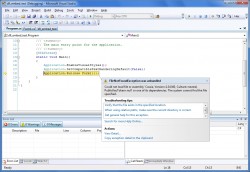Where Does The Term “Spyware” Originate?
The first known recorded use of the term “spyware” reputedly appeared in a Usenet post on October 16, 1995 that took a humorous stab at Microsoft’s business model. The term “spyware” was applied to espionage equipment until its next appearance in 1999. Zone Labs used the term in a press release for their new Zone Alarm Personal Firewall software. From then on, the term “spyware” has been applied as we know it today. The first anti-spyware program, OptOut, was released in 2000 by Steve Gibson of Gibson Research, as the result of the growing problem of spyware. Other spyware removal and prevention tools have since surfaced.
Where Does Spyware Come From?
Spyware almost always comes as “extra baggage” from sites providing “shady” content, such as pornography, warez, and game cheats. ActiveX pop-ups asking for permission for software modules to be installed is another method. They usually go hand-in-hand with sites containing “shady” or “underground” content.
Another large source of spyware comes from downloaded shareware or freeware programs. Licensing agreements included with downloaded software sometimes warn the user that some sort of spyware program will be installed along with the main software package. However, the spyware notices in licensing agreements are usually difficult to locate, as they are often seeded within lengthy, hard-to-read legal disclaimers. However, this doesn’t mean that all freeware and shareware programs contain spyware.
Some file sharing networks, such as KaZaa, have been flooded with all sorts of malicious files and programs, and what you may be downloading might not be what you think it is.
All in all, there’s no such thing as a “free lunch” when it comes to illegitimate software and “free” underground content.
Is Spyware Illegal?
As of now, spyware itself is not illegal. It is simply software that is freely downloadable off of the Internet. The only recognized form of illegal software is known as “warez”. However, this doesn’t make all of the activities performed by spyware legal. Some of them are quite illegal. Because of the array of illegal activities that can be spawned from spyware, the U.S. Courts have been tossing around the issue of spyware and its legality. No formal decision has yet been reached. There is, however, an Anti-Spyware bill floating around the U.S. Legislative system that is undergoing amendments. The details of the most recent actions concerning this bill can be found in Wired News. As for the actual bill itself, a readable copy can be found here.




 AdamTheTech.com and respective content is Copyright 2003-2026.
AdamTheTech.com and respective content is Copyright 2003-2026.